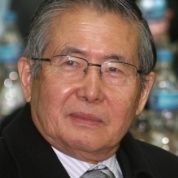As Peruvians head to the ballot box on April 10, they will undoubtedly consider the legacy of Alberto Fujimori, who ruled the country as a dictator from 1990 to 2000.

During his 10-year tenure as president, he was linked to various crimes ranging from illegal telephone tapping, inappropriate use of state funds, to state-sponsored massacres.
Observers argue that the aftershocks from Fujimori's "chuponeo" (eavesdropping) incident are still being felt today under outgoing President Ollanta Humala, whose administration has been linked to illegal surveillance against the vice president, political figures, environmental protesters, and leaders of the youth labor movement.
Fujimori, 77, is currently serving a prison sentence for his role in kidnappings and murders carried out by the Grupo Colina death squad. Fujimori has also been convicted of an embezzlement and bribery scheme, in which he manipulated media outlets through systematic bribes paid to the owners, editors, and writers of various tabloids during his second term.
Before and After Alberto Fujimori
Alan Garcia, who is seeking the presidency for a third time, failed Peru gravely when he was in office from 1985 to 1990.
RELATED:
The Who's Who of Peru's Corruption-Plagued Presidential Race
Garcia did inherit a country with very sluggish economic growth, huge inflation, flight of currency out of the country, immense poverty and social unrest, and instead of making improvements Garcia's impulsive decisions led the country even further into chaos, including massive hyperinflation.
His failure to put the economy under control and his success in worsening poverty and social tensions contributed to the rise in violence and in acts of terrorist groups which destabilized the country even more.
Garcia's answer to the chaos was military force which committed numerous massacres even against those who were only suspected of being involved with the Shining Path.
In general, Garcia's terrible management paved the way for an authoritarian leader like his successor Alberto Fujimori.
And so in 1990, voters were concerned about the economy, the increasing terrorist threat from Shining Path and government corruption, which made them believe that the then relatively unknown mathematician-turned-politician, Alberto Fujimori, would be a good choice.
Fujimori immediately put in place drastic economic reforms to tackle inflation which was hovering at over 7,600 percent. He managed to reduce it to only 139 percent by 1991.
After the April 5, 1992 coup against himself, Fujimori privatized state-owned companies, removed investment barriers and significantly improved public finances. After Fujimori's constitutionally questionable decision to seek a third term in office, he was declared president-elect in 2000.
Fujimori restored the country's economic stability and successfully fought terrorism but his methods drew charges of authoritarianism, human right violations, corruption and embezzlement for which he is currently in jail.
And then came President Alejandro Toledo (2001-2006). His government was successful in consolidating Peru's return to democracy.
RELATED:
Peruvians Protest Keiko Fujimori and Electoral 'Dirty War'
“His strong economic management and promotion of foreign investments led to an impressive economic boom in the country which laid the foundation of Peru's present success, inflation nearly disappeared. But as so often the economic advancement didn't reach all; poverty only decreased slightly and only a few new jobs were created. Strikes and demonstration against Toledo's policies became frequent and corruption scandals undermined his administration,” said Limaeasy.com.
Garcia returned to the presidency from 2006 to 2011. This second time around, he managed to enhance the economic and social status of the country. He undoubtedly sided with the U.S. embracing free markets and free trade, making Peru one of Latin America's top destinations for foreign investment.
With him, foreign investment increased, the economic status of the country improved, public debt dropped and foreign reserves went up, but the poor continued to be poor, meaning all his achievements were aimed to only benefit the rich.
Many Peruvians were exasperated with the fact that foreign companies took hold over the country's wealth of natural resources and the growth of drug trafficking. Peru is now number one producer of cocaine in the world.
Lastly, President Ollanta Humala from 2011 to present. He won after a fierce face off with Keiko Fujimori promising the "poor and disenfranchised" Peruvians a fair share of the wealth from Peru's key natural resources. This never happened.
And Now Keiko Fujimori
Now, Alberto's daughter Keiko is running for the presidency of Peru. The right-wing candidate is currently in first place, with roughly 40 percent support ahead of the vote on April 10.
Some protesters have accused the human rights abuser's daughter of paying for people to support her.
RELATED:
Why Keiko Fujimori Had to Promise Not to Carry Out a Coup
Electoral authorities launched an investigation after accusations emerged from photographs and video reportedly showing her and a running mate handing out gifts at rallies. Fujimori has denied the allegations and called them “absurd."
By linking her campaign to her father’s electoral strategies, she has sparked fears that if elected she could repeat the worst aspects of the Fujimori dictatorship, particularly with regards to human rights abuses, judicial independence, government transparency and the fight against corruption.
Furthermore, Keiko has made it clear that she represents her father’s administration in terms of economic policy vowing to uphold the pro-business policies enshrined in the 1993 constitution under the government of her father, who to this day, is highly criticized for his severe austerity measures, which included mass privatizations, lifting of currency controls and slashing of government subsidies for social programs.
Critics claim that voting for Keiko Fujimori would grant legitimacy to a government that would represent a continuation of many of the policies implemented under her father.
Alberto Fujimori is currently being held in a prison on the outskirts of the capital Lima and remains a deeply divisive figure in Peru.